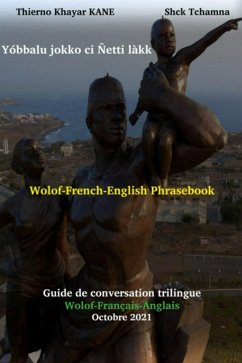This book contains over 2000 expressions carefully chosen from the most used expressions in everyday conversations, in Wolof language. It is very well organized in 32 chapters including everything you need to communicate fluently in everyday life.
Organizing the book by topic makes its content easily accessible. The author recommends that you test its content with native speakers, depending on the context: Introduce himself, Greet people, Say goodbye, Ask questions, Talk about love, feelings, romance, ask for forgiveness, Whish people happy feast, Empathize with other people's pain, show indignation, use expressions of astonishment, ask people how they are feeling, communicate at the table, ask questions about culture using cultural vocabulary, etc.
Although it is especially recommended for beginners of the language and those at the intermediate level, people who already have a good command of the language will also be happy with the book, thanks to the neologisms there. Indeed, to avoid borrowing word from foreign languages, the author was forced to formulate new words and expressions which make the conversation even more authentic
==================================================================================
Ce livre est un dictionnaire des expressions usuelles en langue Wolof. Il contient plus de 2000 expressions soigneusement choisis parmi les expressions les plus utilisées dans les conversations de la vie quotidienne, dans la langue de Wolof. Il est très bien organisé en 32 chapitres comprenant tout ce dont vous avez besoin pour communiquer couramment dans la vie quotidienne.
L'organisation du livre par thèmes rend son contenu facilement accessible. L'auteur vous recommande de tester son contenu avec des natifs, selon le contexte : Faire les présentations, Salutations et accueil, Dire au revoir, Poser les questions, Amour, sentiments, romance, demander pardon, souhaits de fête, Compatir à une douleur, manifester son indignation, utiliser des expressions d'étonnement, demander l'état de santé, communiquer à table, poser des questions sur la culture grâce au vocabulaire culturel, etc.
Bien qu'il soit spécialement recommandé aux débutants de la langue et ceux du niveau intermédiaire, les personnes ayant déjà une bonne maitrise de la langue y trouveront aussi leur compte grâce aux néologismes qui s'y trouvent. En effet, pour éviter des emprunts systématiques aux langues étrangères, l'auteur s'est trouvé obligé de formuler des nouveaux mots très élégants qui rendent la conversation encore plus authentique.
Organizing the book by topic makes its content easily accessible. The author recommends that you test its content with native speakers, depending on the context: Introduce himself, Greet people, Say goodbye, Ask questions, Talk about love, feelings, romance, ask for forgiveness, Whish people happy feast, Empathize with other people's pain, show indignation, use expressions of astonishment, ask people how they are feeling, communicate at the table, ask questions about culture using cultural vocabulary, etc.
Although it is especially recommended for beginners of the language and those at the intermediate level, people who already have a good command of the language will also be happy with the book, thanks to the neologisms there. Indeed, to avoid borrowing word from foreign languages, the author was forced to formulate new words and expressions which make the conversation even more authentic
==================================================================================
Ce livre est un dictionnaire des expressions usuelles en langue Wolof. Il contient plus de 2000 expressions soigneusement choisis parmi les expressions les plus utilisées dans les conversations de la vie quotidienne, dans la langue de Wolof. Il est très bien organisé en 32 chapitres comprenant tout ce dont vous avez besoin pour communiquer couramment dans la vie quotidienne.
L'organisation du livre par thèmes rend son contenu facilement accessible. L'auteur vous recommande de tester son contenu avec des natifs, selon le contexte : Faire les présentations, Salutations et accueil, Dire au revoir, Poser les questions, Amour, sentiments, romance, demander pardon, souhaits de fête, Compatir à une douleur, manifester son indignation, utiliser des expressions d'étonnement, demander l'état de santé, communiquer à table, poser des questions sur la culture grâce au vocabulaire culturel, etc.
Bien qu'il soit spécialement recommandé aux débutants de la langue et ceux du niveau intermédiaire, les personnes ayant déjà une bonne maitrise de la langue y trouveront aussi leur compte grâce aux néologismes qui s'y trouvent. En effet, pour éviter des emprunts systématiques aux langues étrangères, l'auteur s'est trouvé obligé de formuler des nouveaux mots très élégants qui rendent la conversation encore plus authentique.
Dieser Download kann aus rechtlichen Gründen nur mit Rechnungsadresse in A, B, CY, CZ, D, DK, EW, E, FIN, F, GR, H, IRL, I, LT, L, LR, M, NL, PL, P, R, S, SLO, SK ausgeliefert werden.


